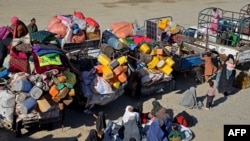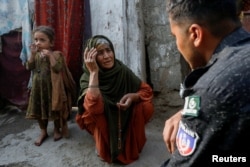The United Nations and partner agencies renewed a call Tuesday for countries to immediately suspend mass deportations of Afghan nationals, citing the onset of a harsh winter and the “worsening” humanitarian crisis in Afghanistan.
The call comes amid reports that Iran and Pakistan have collectively forced out more than 500,000 Afghans over the past two months, with the number of deportees growing by the day.
The International Organization for Migration, or IOM, said Tuesday that nearly 375,000 Afghans returned home from Pakistan through the Torkham and Spin Boldak border crossings between the two countries. De facto Afghan Taliban authorities have reported more than 400,000 returnees from the neighboring country.
The IOM statement noted that the number of border crossings dramatically increased from 200 daily to 17,000 after the Pakistani government ordered all undocumented foreigners, including an estimated 1.7 million Afghans, to leave the country by November 1 or face forcible expulsions.
“Their situation is desperate; most people told us they were forced to leave the country and leave belongings and savings behind,” said Maria Moita, chief of the IOM Afghanistan mission.
“People arriving in Afghanistan are extremely vulnerable and need immediate support at the border as well as for the long term in the areas of return,” Moita stated. “This is a significant humanitarian crisis, and funds are urgently needed to continue providing immediate assistance after arrival to ensure a safe and dignified return.”
Official Pakistani data shows that Afghans who have returned or are in the process of returning are doing so “voluntarily,” and only 16% of them were deported.
The Taliban government in Afghanistan has decried the evictions and sought their reversal. Islamabad has rejected the criticism, saying the crackdown is targeting foreigners who are residing illegally or overstaying their visas.
Afghan media quoted de facto Taliban authorities as reporting that more than 120,000 refugees left Iran within the last two months, saying 90% of them were forcibly expelled. Tehran has not officially announced its crackdown, but Iranian authorities have in recent weeks repeatedly vowed to deport all illegally residing Afghans.
The Taliban have established large camps on the Afghan side of the border with Pakistan where returning families await immediate critical aid, such as shelter, essential household items, and healthcare, before proceeding to intended areas of return.
Philippa Candler, representative of the U.N. High Commissioner for Refugees (UNHCR) in Pakistan, said Tuesday that “mass arrivals are adding to the ongoing humanitarian crisis” in Afghanistan, where winter temperatures are already dipping to -4°C in some locations.
“Many Afghan returnees are vulnerable, including women and children, who could lose their lives in a harsh winter if left without adequate shelter,” she told a news conference in Geneva.
Candler said the UNHCR staff and humanitarian partners are scrambling to monitor and assist the influx of returning Afghans.
“Those arriving now at border points inside Afghanistan are exhausted and in need of emergency assistance. Many have complained of harassment, extortion, and mistreatment. Desperate women and children are among those who were not given a choice but to pack and leave,” she added.
The IOM urged the international community to increase support at a time when funding for the people in Afghanistan is rapidly declining.
“After decades of conflict, instability, and economic crisis, Afghanistan will struggle to absorb the high number of returning families, many of whom have not lived in the country for decades, if ever,” the organization said, adding that returnees face a “precarious, uncertain future” because some six million people are already internally displaced in the conflict-torn country.
Pakistan defends the deportations, blaming illegally residing Afghans for playing a role in a recent surge in deadly militant attacks in the country, charges Taliban authorities reject.
Authorities, however, say 1.4 million legal Afghan refugees carrying “proof of registration” cards are not subject of the ongoing crackdown. Earlier this month, the government extended the legal residence status of these individuals until December 31. Additionally, more than 800,000 Afghan migrants registered by the Pakistani government in collaboration with the former Afghan government, and carrying the IOM-approved Afghan citizenship cards, are also not the target of the deportation plan.





